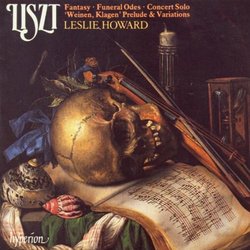| All Artists: Franz Liszt, Leslie Howard Title: Liszt: Fantasy, Variations, Funeral Odes, Concert Solo Members Wishing: 1 Total Copies: 0 Label: Hyperion UK Release Date: 11/15/1993 Album Type: Import Genre: Classical Styles: Opera & Classical Vocal, Chamber Music, Forms & Genres, Fantasies, Symphonies, Historical Periods, Classical (c.1770-1830) Number of Discs: 1 SwapaCD Credits: 1 UPC: 034571163024 |
Search - Franz Liszt, Leslie Howard :: Liszt: Fantasy, Variations, Funeral Odes, Concert Solo
 | Franz Liszt, Leslie Howard Liszt: Fantasy, Variations, Funeral Odes, Concert Solo Genre: Classical
|
Larger Image |
CD DetailsSimilarly Requested CDs
|
CD ReviewsLiszt the Colossus Hexameron | 08/25/2006 (5 out of 5 stars) "This recording promulgates many lesser-known and large-scale works which demonstrate colossal piano writing and require titanic pianism to deliver. Not many pianists can tackle the "Fantasy and Fugue on B-A-C-H" or withstand the stamina-siphoning "Grosses Konzertsolo." Fortunately, the indefatigable Leslie Howard not only handles them, but gives exemplary performances. Many organophiles consider Liszt's "Fantasy and Fugue on B-A-C-H" a part of the standard organ repertoire. But I think the piano is a much greater medium for capturing its dramatic polyphony and important melodic strands. At times Liszt's version for piano sounds like a different composition: so many harmonic changes and much of the melodic filigree inherent in this work become clearer. Of the many interpretations I've heard, I think Howard is among the top greats. He isn't afraid to release a violent onslaught and draw upon the percussive organ-like volume of the piano. Howard transcends "bombast," that oft-used adjective to criticize much of Liszt's music, and instead unfurls a musical stratum of mind-blowing virtuosity and sonorous heaven-storming ideas. This is indisputably a Liszt masterpiece and Howard plays the hell out of it. The Prelude to "Weinen, Klagen, Sorgen, Zagen" is Liszt's own passacaglia on a Bach cantata (BWV 12) which Bach later used for his Mass in B minor. Composed in 1859, this prelude exhibits much restraint for Liszt and emphasizes the serenity of gentle counterpoint. Affected by the death of his daughter, Blandine, Liszt revised the prelude in 1862 and transformed it into an epic work containing 43 variations. Liszt's variations are as ingenious as the later models by Busoni and Godowsky. And Howard makes a powerful argument with playing that underscores not only the dramatic furor of this work, but the gorgeous respites of melancholy and contemplation. Liszt's Three Funeral Odes are barely known except to Liszt scholars, cohorts and collectors. "Les Morts" is a fine piece of piano music whether through its Romantic gestures or profound music content. I prefer Philip Thomson's interpretation (Liszt: Complete Piano Music, Vol. 3), but Howard's take on this poetic work is commendable. "La Notte" may be the most striking and haunting number from this triptych of odes, though. Liszt borrows the theme from his "Il Penseroso" of the Annees de Pelerinage and employs this dark funereal subject as the main thematic material of the ode. "Le Triomphe Funebre du Tasse" is another obscure but exquisite creation from Liszt. Tasso, the 16th century Italian poet immortalized by Goethe, was a significant figure to Liszt. Two themes from his own symphonic poem "Tasso, Lamento e Trionfo" are featured in this ode, which could be regarded as a completely independent but supplemental tone-poem. This work explores a wide range of emotions: Romantic passages reminiscent of Wagner's Tristan, ghostly adagios, and ecstatic climaxes replete with rip-roaring virtuosic passages. The earliest composition presented in this volume is the massive and substantial Grosses Konzertsolo. Liszt was clearly fond of the ideas in this work since he used them for at least three additional works, most notably the Concerto Pathetique. The original Grosses Konzertsolo was written in 1849 and exists like a junior "Sonata in B minor": the virtuosity and unbridled grandeur of the piano writing makes it a 20-minute hulking beast of technical challenges. Adolph Henselt, the dedicatee of the composition, admitted he couldn't play it. Clara Schumann read through it and felt it was merely empty virtuosity. But I think this is an original and superlative concert work. A mixture of both thundering passagework and poignant emotions, the Grosses Konzertsolo can be an example of extroverted virtuosity or a convincing emotional tour-de-force. Others who have recorded this work, especially Frederick Marvin and Giuseppe Andalaro sound lackluster compared to Howard. Howard shows no signs of struggle; he throws all of his physical might into the tumultuous explosions while summoning incredible musicality in the process. Bottom line: This recording is an invaluable addition to the 59-volume Hyperion series. I urge anyone who has an interest in hearing more from Liszt than the usual Transcendental Etudes or Hungarian Rhapsodies to investigate the music on this disc. There are truly superior but neglected masterpieces here and Howard is the right champion to showcase them. Also, Howard's Grosses Konzertsolo is, in my view, the greatest interpretation yet recorded." Another stunner Franz Liszt | 09/17/1999 (5 out of 5 stars) "I don't want to sound like a broken record, but this CD belongs in your classical library, as does most everyone in the Liszt-Howard cycle of solo piano music. Every piece on this record is masterful." Between Earth and Heaven Franz Liszt | 04/03/2005 (3 out of 5 stars) "Nice stuffs played by Mr. Howard's usual manner: very charming sound and virtuosity, sometimes hurried slow (IMPORTANT) sections. Above all, GREAT DEAL to face ALL Piano Music by Liszt, where each note says something! Not to talk about easiness of Howard's playing! Unbelievable!
3 funeral odes are really great "new" works. " |

 Track Listings (7) - Disc #1
Track Listings (7) - Disc #1

